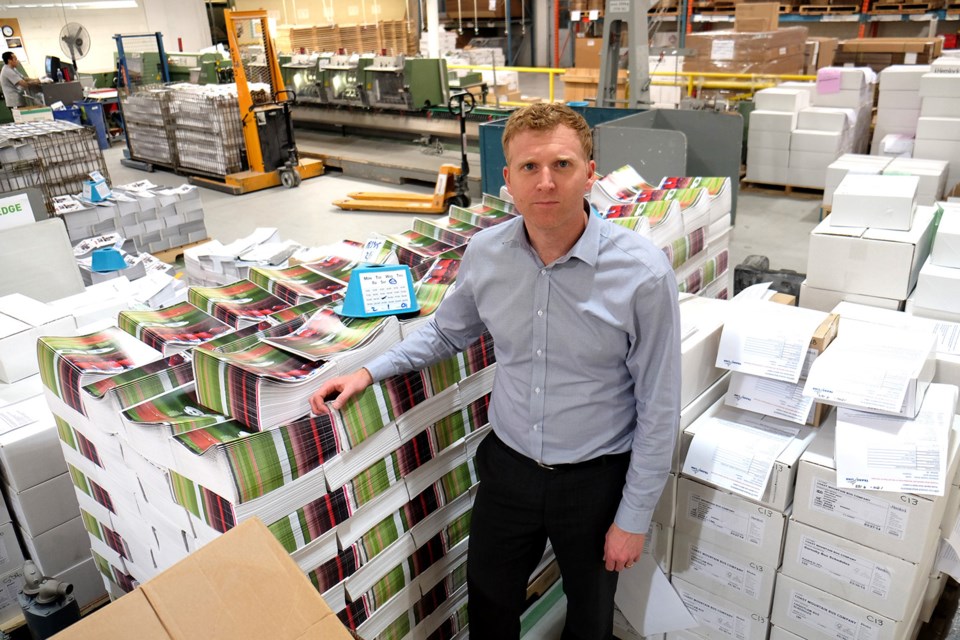Looming changes to B.C.’s recycling program have Burnaby businesses calling for the provincial government to delay implementation before it’s too late.
Burnaby-based Hemlock Printers is one of many businesses in the city asking the government to reconsider such a sudden and drastic change for fear the transition won’t go as smoothly as officials are expecting.
“It needs to be more carefully considered just out of the need for the program to work,” Richard Kouwenhoven, president and general manager of Hemlock, told the NOW. “It’s not a question of a delay tactic to avoid an expense, it’s really that Hemlock as a company and the industry that we’re in, have significant concerns about how this has been thought out and how effective it will be in the long-term.”
While Hemlock Printers won’t be paying into the new system, which will be administered through Multi-Material B.C. (MMBC), many of its clients will.
“Our concern is that some of our customers would be impacted with significant costs, and costs that would potentially prevent them from being able to operate or put their business in a very challenging position,” Kouwenhoven said.
Under the MMBC stewardship program, which officially begins May 19, businesses that use printed or packaged products will be required to pay the recycling fees associated with those products. The fees range from 20 cents to 70 cents per kilogram for printed or packaged materials – a fraction of the fees businesses in Ontario are paying even though the Canadian Stewardship Services Alliance oversees both programs.
In Ontario, businesses pay between 0.42 cents and 23.27 cents per kilogram of print and packaging materials because its government subsidizes some of the costs, and Kouwenhoven doesn’t think that’s fair.
“The rates in B.C. are quite high in contrast to other jurisdictions, and the idea of switching from a taxpayer model to a business model from zero per cent to 100 per cent in one year is quite a dramatic shift,” he said.
This is why Hemlock Printers is hoping the government delays implementing the new program. Kouwenhoven believes if the program goes ahead as planned there’s a good chance any flaws will be magnified.
“The change needs to be managed in a way that allows that transition to take place effectively, and the rates need to be established in an equitable way and in a careful way so that the businesses that are paying into the system are paying fairly into the system,” he said.
While Kouwenhoven isn’t overly optimistic the government will put a hold on the MMBC program, some recent changes, including the exemption of small businesses from the program, have made him hopeful that lobbying by both industry and business leaders might lead to some modifications – or at the very least a smoother transition.
“I think we still have a duty as an industry to alert the government and the MMBC that we’re concerned about the success of this program and the costs that are going to be borne by the producers, which in our case are some of our customers,” he added.
Hemlock Printers is not alone in its fight.
The Burnaby Board of Trade recently issued a statement echoing Kouwenhoven’sconcerns, including the long-term viability of the program and the negative impact it could have on its members.
“As there are many industries and businesses that still have concerns and questions about the MMBC program, I feel it is appropriate that we put the brakes on these regulations until this can be sorted out,” stated Paul Holden, Burnaby Board of Trade president and CEO.
“After 30 years in the newspaper and magazine sector, I understand their concerns particularly and appreciate the unique importance of that industry to our communities. But there are also many other businesses who do not understand how MMBC will impact them or do not feel that they have been appropriately consulted.”
For information on the new MMBC program and whether the change will affect your business, visit www.bbot.ca/advocacy and click on Multi-Material British Columbia (MMBC) or visit MMBC’s website at www.multimaterialbc.ca.
For information on the campaign opposing the new rates and system, go to www.rethinkitbc.ca.
Follow Cayley on Twitter, @cayleydobie



